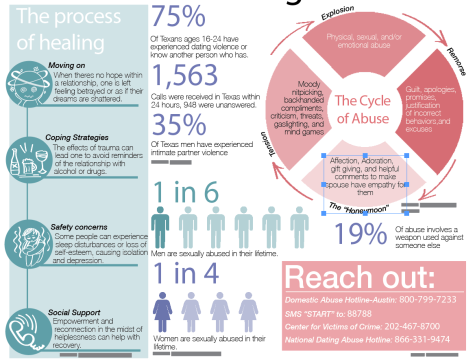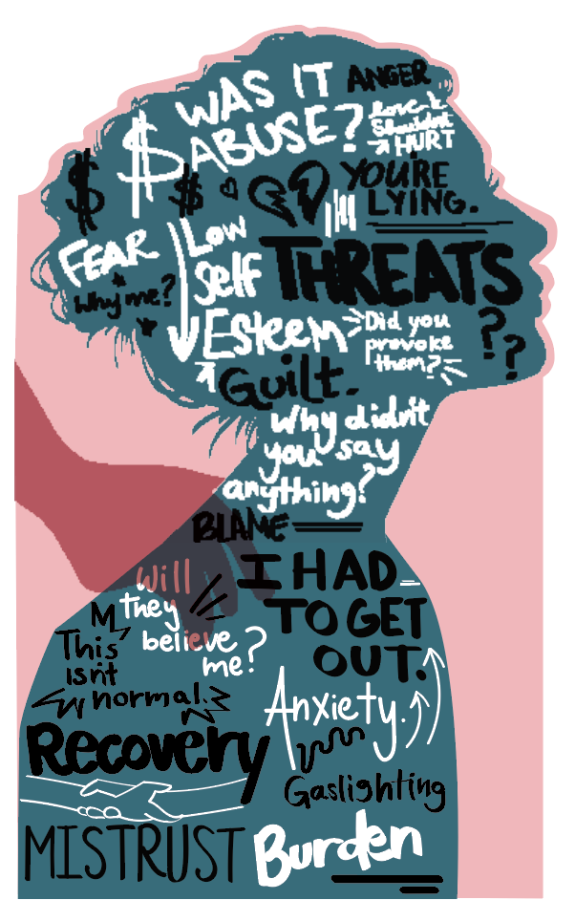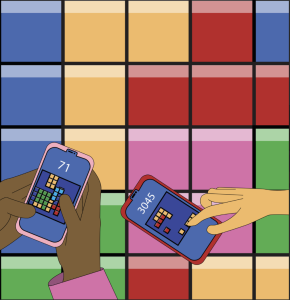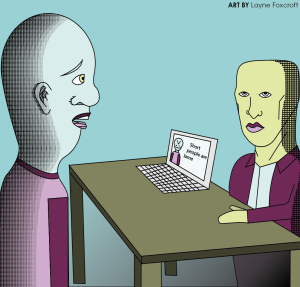The Face of Domestic Violence
Even when the violence subsides, many are left to pick up the pieces of their mental health.
June 1, 2022
An ongoing court case showcases the ins and outs of abusive relationships
Each day, you walk down the halls and see the same thing. Regularly you see two people walking close, maybe even holding hands, suddenly you see as they fall into a disagreement. Just before they walk into class, they leave each other with a bitter goodbye. You’re unable to see why they became boyfriend and girlfriend in the first place. But they won’t break it off, they won’t end things before they get ugly. That’s because they already are.
This is the common pipeline of domestic violence for men and women in America.
But it gets more complicated when they have to get out, really, they need to get out. When they finally face their fears, survivors are left wondering, “what now?” Confronting their abuser, only for those to view their relationship like a one-sided dice, seeing every abusive relationship the same. Many are led to believe that men are always the ones who abuse. Or, women are to blame for not getting out of the relationship before things got violent. Before they threatened her about what would happen when she tried to leave, like she should’ve known better.
“I know that controlling and gaslighting occurs in high school relationships,” senior Maddie Savasky said. “Gaslighting is misleading someone and making them question their perception. It’s manipulation. The person manipulating is doing it to have control over the other, and to make themselves feel better, all of which are lies. I feel like domestic violence is physical and emotional.”
Most recently, the Johnny Depp v. Amber Heard trial has put these dynamics in the limelight. In 2018, when the Washington Post published an editorial written by Heard, Depps’ faced a lot of public backlash on an alleged claim of domestic violence. While Depp’s name was not mentioned in the article, four days after it was published, Disney removed Depp from the “Pirates of the Caribbean” five-film franchise.
“I think that the worst part is just hearing how horrible Heard has been to Johnny,’’ junior Jake Statchura said. “The fact that Depp’s career was ruined and she was okay with that is disgusting. She didn’t just ‘kind of ruin’ his career, she totaled it. But then she just went on to star in ‘Aquaman 2.’ Even after all that, she came out saying that she was hurt. It’s not right.”
In Heard’s article, titled “I Spoke Up Against Domestic Violence,” she wrote about becoming a public figure representing abuse. However, in 2022, Depp’s testimony in court against Heard brings light to how her words may not be true.
“There were no repercussions for her behavior,” Statchura said. “She’s not going to be anything other than a narcissist. She’s lying to everyone. She’s not taking it seriously. I definitely feel like he should go back to getting the roles that he deserves. Since she’s getting sued I don’t think she should be getting roles. Instead of roles, she should be getting prison time.”
According to the ManKind Initiative, one in three victims of abuse is male. With the ManKind Initiative Helpline, 64% would have never called if the service was not anonymous.
“I remember reading that there was this shelter made for male victims of abuse that opened in New York,” Statchura said. “There was a bunch of outcry from people saying that male victims were not real and that men weren’t victims at all. This got the shelter shut down. I definitely think that there are a lot more men that can be victims that don’t get the same amount of representation.”
Fighting abuse in relationships is often viewed as a fine line. However, it’s not always black and white, more often it’s viewed as a spectrum.
“I really feel like male victims of abuse don’t get the treatment they deserve,” Statchura said. “Female victims are always talked about since we tend to believe the dynamic of male abusers and female victims so when the script is flipped, we don’t have a way to respond to it. We don’t have the same conscience or the same perspective.”
More often than not, domestic violence follows a specific power dynamic between all genders. Power dynamics are best characterized by imbalances in a relationship where one person holds something over the other to manipulate them. According to Psychology Today, men and women’s voices differ when it comes to confronting abuse. Diminishing one voice over the other continues a cycle of silence.
“With the Johnny Depp trial, we can see ‘hey, even male celebrities can be victims, they can be damaged,” Statchura said.”I hope that this case will change our consciousness about male domestic violence.”
Even when the violence subsides, many are left to pick up the pieces of their mental health. Guidance counselor Hunter Ruffin explains the aftermath of abuse.
“It definitely makes it hard to trust people and feel worthy or secure in a relationship,” Ruffin said. “It can be hard to feel like that person won’t hurt them in any way. It just makes a person feel not worthy of those genuine relationships. Another thing that could happen is that these situations can make someone more hostile to future relationships. If they were never taught an appropriate way to manage their aggression then there is a chance that they could become an abuser as well.”
The pattern of controlling, threatening, and degrading behavior that comes with domestic violence is viewed as just that. But there’s an element of abuse that tends to get overlooked; financial abuse.
“So one of the things, I think happens is a lot of times women get locked into not having the ability to support themselves,” AP Macroeconomics teacher Ruth Narvaiz said. “So the abuser can control everything they do because he’s got all the financial resources. Therefore, an abused person is stuck and they don’t have any kind of way to escape. Oftentimes, they don’t have their own money. Sometimes they don’t have their own bank accounts. And so they have no way to get out of abusive situations.”

Getting away from oppressive relationships while in isolation is displayed in the media in many different ways. According to Narvaiz, mental abuse makes it also really difficult sometimes to break through abuse unlike how the media shows.
“I always think of movies like ‘Sleeping With the Enemy,’ where the women come back and they’ve learned how to do karate and they have all of these skills,” Narvaiz said. “I think they’ve made it look unrealistic and easier to escape than it really is.”
These preconceptions of abuse created by the public can be grounds for victim blaming. The Atlantic defines victim blaming as the act of invalidating one’s involvement with a crime or accident, favoring the criminal’s rationality over the victim’s experience.
“If you’re being financially controlled, You don’t have a way to go learn how to swim and get away from your abuser,” Narvaiz said. “The media makes it look perhaps like it’s easier to get out of the situation I have seen people say things to rape victims like ‘Well? Were you wearing something skimpy?’ or ‘Did you lead them on?’ I think that’s part of maybe an old kind of gender roles stereotype that people still kind of hold on to.”
Barriers caused by financial abuse, according to Women’s Aid, don’t rely on physical proximity so it can continue after separation. These barriers make it more likely for women or men to continue in unhealthy relationships, increasing the risk of danger to the victim.
“They say people choose the same kinds of partners over and over again,” Narvaiz said. “So once you’ve selected an abuser, you’re more likely to be in an abusive relationship again. I think it’s almost impossible to recover from financial abuse. Unless you purposefully select an education or a career goal that allows you to build your own financial freedom, you can get stuck.
According to the National Coalition Against Domestic Violence around 21-60% of victims lose their jobs due to the effects of abuse. Speaking from personal experience, Narvaiz addressed how domestic abuse can leave someone trapped.
“My niece was in an abusive relationship and she got out and then I was so proud of her because she went to nursing school,” Narvaiz said “She was able to support herself and graduate, now she’s a physician’s assistant, working in an emergency room and making good money. Unfortunately, not everybody is able to do this.”
Not everyone can say they went to nursing school to pick themselves off their feet. According to WomensAid, About 32% of their respondents stated that their own money was controlled by their abusers.
“Get professional help, not just with the abuse, but with finances,” Narvaiz said. “Find someone who can help you deal with your finances. You probably will have debt so they will need a debt advisor to aid with that. They may even need to declare bankruptcy and move on. They will need financial advice, not just try to figure it out themselves.”
Getting help from other resources is one of the steps one can take to free themselves from abusive situations. Whether it’s financial, legal, or supportive, like therapy, all can aid in the process of moving on.
“Abuse makes someone vulnerable, getting help is a vulnerable thing,’’ Statchura said. “We don’t really see the media portray men getting out of these relationships in healthy ways or in any positive way. It’s always stigmatized. I’m really hoping that things will shift our perspective and make the media believe that ‘hey, getting help, is what needs to happen no matter who’s getting abused, no matter their gender, or who they are.’ It’s okay for somebody to get help. It’s okay for somebody to be vulnerable.”










